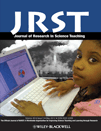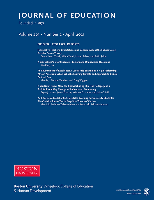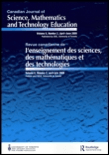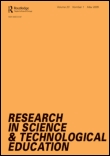
JOURNAL OF RESEARCH IN SCIENCE TEACHING
Scope & Guideline
Elevating Science Teaching Through Scholarly Excellence
Introduction
Aims and Scopes
- Equity and Inclusion in Science Education:
The journal emphasizes research that addresses the barriers faced by marginalized groups in science education, aiming to promote equitable access and participation for all students. - Teaching and Learning Practices:
It explores effective instructional strategies and pedagogical practices that enhance student engagement, understanding, and performance in science, including inquiry-based and experiential learning. - Integration of Technology:
The use of technology in science education is a key focus area, with research addressing how digital tools and resources can support teaching and learning in innovative ways. - Cognitive and Affective Dimensions:
The journal investigates the cognitive processes involved in learning science, as well as the emotional and motivational aspects that influence student engagement and identity in STEM fields. - Community and Contextual Learning:
Research published in the journal often focuses on the role of community, culture, and context in shaping science education, emphasizing the importance of place-based and culturally relevant pedagogies. - Professional Development for Educators:
The journal also covers studies related to teacher education and professional development, highlighting best practices for supporting science teachers in their instructional roles.
Trending and Emerging
- Social Justice and Equity in STEM:
There is a significant increase in research addressing social justice issues, equity, and inclusivity in STEM education, focusing on the experiences of underrepresented groups and strategies for creating more equitable learning environments. - The Role of Emotion in Learning:
Emerging studies are increasingly exploring the emotional dimensions of science learning, investigating how emotions influence student engagement, identity, and motivation in STEM fields. - Misinformation and Science Communication:
With the rise of misinformation, particularly in the context of health and science, research is increasingly focusing on how to prepare students to critically evaluate information and engage in effective science communication. - Community-Driven and Culturally Relevant Pedagogy:
Research emphasizing community involvement and culturally relevant contexts in science education is on the rise, reflecting a growing acknowledgment of the importance of local knowledge and experiences in teaching science. - Integration of Computational Thinking and AI:
The integration of computational thinking and artificial intelligence in science education is emerging as a key area of interest, with studies exploring how these concepts can enhance student learning and engagement.
Declining or Waning
- Traditional Science Pedagogy:
There appears to be a waning interest in traditional, lecture-based approaches to science teaching as more research emphasizes active, student-centered learning methodologies. - Focus on Basic Science Content Knowledge:
Research centered predominantly on rote learning of science content knowledge is becoming less common, with a greater emphasis now placed on understanding scientific practices and processes. - Standardized Testing and Assessment:
Studies specifically analyzing the impact of standardized testing on science education seem to be declining, as the focus shifts toward more holistic and formative assessment practices. - Disciplinary Silos in STEM Education:
There is a noticeable decrease in research that examines science education in isolation from technology, engineering, and mathematics, as interdisciplinary approaches gain more traction. - Teacher-Centric Research:
Research focusing solely on teacher behaviors or practices without considering student perspectives or experiences is becoming less prevalent, indicating a shift towards more inclusive studies.
Similar Journals

TEACHING SOCIOLOGY
Transforming Teaching, Inspiring Inquiry.TEACHING SOCIOLOGY is a distinguished journal published by SAGE PUBLICATIONS INC, focusing on the pedagogical aspects of sociology and its related fields. With an ISSN of 0092-055X and an E-ISSN of 1939-862X, this journal caters to academics looking to enhance the teaching and learning experiences within sociology education. As evidenced by its impressive Q1 and Q2 rankings in Sociology and Political Science and Education, respectively, TEACHING SOCIOLOGY holds a notable position in the academic landscape, ranking in the top percentiles among its peers. This journal is particularly valuable for educators, researchers, and practitioners seeking to contribute to the advancement of teaching methodologies within the social sciences. Featuring a wide range of articles aimed at fostering innovative teaching strategies and scholarly discourse, TEACHING SOCIOLOGY is an essential resource for anyone dedicated to the cultivation of informed sociological inquiry. With its historical significance established since its inception in the late 1980s, the journal continues to impact contemporary educational practices in an ever-evolving academic environment.

Journal of Mathematics Teacher Education
Transforming Mathematics Education for Tomorrow's LeadersJournal of Mathematics Teacher Education, published by SPRINGER, serves as a pivotal platform for scholarly communication in the fields of Education and Mathematics. With a distinguished Q1 ranking in both disciplines and exceptional Scopus rankings—placing it in the top 94th percentile for Mathematics and the 84th percentile for Education—the journal is dedicated to advancing research and practice in mathematics education from a global perspective. Established in 2005 and converging towards 2024, it invites contributions that investigate innovative teaching strategies, curriculum development, and teacher education methodologies. Although the journal does not offer Open Access, its rich collection of empirical studies, reviews, and theoretical articles provides invaluable resources for educators, researchers, and students aiming to elevate the quality of mathematics instruction. Situated in Dordrecht, Netherlands, the Journal of Mathematics Teacher Education remains a significant asset to the academic community, fostering discussions that drive progress and enhance student learning experiences.

TEACHING OF PSYCHOLOGY
Fostering Insightful Teaching for Tomorrow's PsychologistsTEACHING OF PSYCHOLOGY is a distinguished academic journal published by SAGE Publications Ltd, focusing on the field of psychology education. Established in 1975, this journal has carved out a vital niche in the academic landscape, facilitating the dissemination of innovative teaching practices, research outcomes, and pedagogical strategies that enhance the learning experience in psychology. With an impressive H-index indicating its influence, TEACHING OF PSYCHOLOGY is ranked in the second quartile for Education and third quartile for Psychology (Miscellaneous) in 2023, reflecting its pivotal role in these fields. The journal boasts a robust Scopus ranking, placing it within the 55th percentile for Social Sciences - Education and the 42nd percentile for General Psychology, demonstrating its relevance and reach among scholars and practitioners alike. Although it does not offer open access, it remains a crucial resource for educators, researchers, and students seeking to enhance their understanding and application of psychological principles in educational settings. By contributing to the ongoing dialogue about effective teaching methodologies in psychology, the journal aims to inspire and inform educators, fostering an environment of rigorous academic inquiry and practical application.

Journal of Education-US
Innovating the future of education with critical insights.Journal of Education-US, published by SAGE Publications Inc, is an esteemed academic journal dedicated to advancing the field of education through rigorous research, theoretical discourse, and diverse methodologies. With both print (ISSN: 0022-0574) and digital (E-ISSN: 2515-5741) formats available, this journal serves as a vital resource for educators, researchers, and policy-makers alike. The journal is classified in the Q2 quartile for Arts and Humanities and Q3 for Education as of 2023, reflecting its influence within the academic community. It holds a respectable rank of #908 out of 1543 in the Scopus database within the Social Sciences Education category, indicating its relevance and contribution to ongoing debates and innovations in educational practices and theories. While not currently an open-access journal, its carefully curated articles provide valuable insights and foster critical discussions that drive the education sector forward. With a publication span from 2005 and ongoing, the Journal of Education-US remains a cornerstone for impactful scholarship in education.

MIER-Journal of Educational Studies Trends and Practices
Exploring trends that transform teaching and learning.MIER-Journal of Educational Studies Trends and Practices is a pivotal academic journal dedicated to advancing the field of education, focusing on innovative research and trends that influence teaching and learning practices. Published by the esteemed MODEL INST EDUCATION & RESEARCH, this journal offers a platform for researchers, educators, and students to disseminate knowledge and insights on various educational methodologies, curricular developments, and pedagogical theories. While the journal's current impact factor is not specified, its commitment to fostering scholarly discourse positions it as a notable contributor to the field. With an ISSN of 0976-8203 and an E-ISSN of 2319-1945, MIER aims to promote open access to current educational research, making it accessible to a global audience. By engaging with contemporary educational issues and emerging practices, this journal serves as a valuable resource for those dedicated to enhancing educational outcomes and developing effective teaching strategies.

Canadian Journal of Science Mathematics and Technology Education
Fostering Excellence in Mathematics and Science TeachingCanadian Journal of Science Mathematics and Technology Education (ISSN: 1492-6156; E-ISSN: 1942-4051) is a prominent publication by SPRINGER based in Switzerland, dedicated to exploring innovative methodologies and practices in the fields of science, mathematics, and technology education. Established in 2001 and continuing to 2024, the journal maintains a strong reputation within the academic community, reflected in its Q2 ranking in the Education category for 2023 and a commendable Scopus ranking that places it in the top 25% of journals within the social sciences education domain (Rank #383/1543). This journal serves as a critical platform for researchers, educators, and practitioners interested in the latest developments, research findings, and discussions pertaining to instructional strategies and curricular advancements. Although it is not open access, the journal's insights and contributions are invaluable for those aiming to elevate educational practices and address contemporary challenges in STEM education.

International Journal of Instruction
Exploring the forefront of teaching and learning methodologies.International Journal of Instruction is a distinguished peer-reviewed journal dedicated to advancing the field of education through high-quality research and innovative instructional practices. Published by GATE Association for Teaching & Education in Switzerland, this open-access journal has been a beacon of knowledge since its inception in 2008, ensuring that impactful educational research is freely accessible to scholars, educators, and practitioners worldwide. With an impressive Q2 ranking in Education and a notable position in the 80th percentile within its category in Scopus, the journal showcases cutting-edge studies and discussions that reflect current trends and methodologies in teaching and learning. The scope of the journal includes a wide array of topics, ranging from instructional strategies to curriculum development, making it a vital resource for anyone engaged in the dynamic landscape of education. Explore the International Journal of Instruction today to contribute to and benefit from the collective wisdom of the global educational community.

Research in Science & Technological Education
Exploring New Frontiers in Science and Technological LearningResearch in Science & Technological Education, published by Routledge Journals, Taylor & Francis Ltd, is a leading international journal dedicated to advancing the field of education within the realms of science and technology. With its ISSN 0263-5143 and E-ISSN 1470-1138, this prestigious journal provides a platform for innovative and rigorous research from 1983 to the present, thus offering critical insights into pedagogical practices, curriculum development, and policy-making. Boasting a remarkable impact, it ranks in the top quartile (Q1) in both Education and Multidisciplinary categories as of 2023, with an impressive Scopus ranking of #270 out of 1543 in Social Sciences _ Education, placing it in the 82nd percentile. Researchers, educators, and students will find invaluable resources and discussions that shape the future of science and technological education in an increasingly complex world. Although this journal does not offer Open Access, it maintains a strong commitment to disseminating high-quality research, making it an essential read for those invested in the evolution of educational practices and outcomes in the STEM fields.

INSTRUCTIONAL SCIENCE
Shaping effective teaching strategies for tomorrow's classrooms.INSTRUCTIONAL SCIENCE is a premier academic journal published by Springer that focuses on advancing the field of education through research in instructional methodologies and practices. With an ISSN of 0020-4277 and an E-ISSN of 1573-1952, this journal is recognized for its rigorous scholarly contributions, evident in its impressive 2023 impact factor that places it in the top quartile (Q1) for both Developmental and Educational Psychology and Education. Situated in the Netherlands, the journal has a comprehensive publication history from 1972, making it a respected source for researchers seeking to explore innovative teaching strategies and learning processes. Its Scopus rankings further reflect its esteemed position, ranking #285 out of 1543 in Social Sciences – Education and #99 out of 360 in Psychology – Developmental and Educational Psychology, highlighting its relevance and impact within these fields. While currently not offering Open Access, INSTRUCTIONAL SCIENCE remains a vital resource for educators, psychologists, and students who are committed to fostering effective learning environments through evidence-based practices.

International Journal for Academic Development
Exploring transformative practices in education.The International Journal for Academic Development, published by Routledge Journals, Taylor & Francis Ltd, is a leading scholarly platform dedicated to advancing the field of education. With an ISSN of 1360-144X and an E-ISSN of 1470-1324, this esteemed journal has garnered attention for its profound contributions, illustrated by its position in the Q2 category of the Education sector for the year 2023, and an impressive ranking of #380 out of 1543 in Scopus Ranks, placing it in the 75th percentile. The journal serves as a vital resource for researchers, professionals, and students who are engaged in academic development and pedagogical innovation from 2010 through 2024. While currently not an open access journal, it remains instrumental in disseminating impactful research aimed at shaping teaching practices and enhancing educational quality across diverse contexts. Set against the backdrop of its U.S. publication in Abingdon, England, the journal’s commitment to fostering a collaborative academic environment continues to attract a wide readership keen on exploring new educational paradigms.